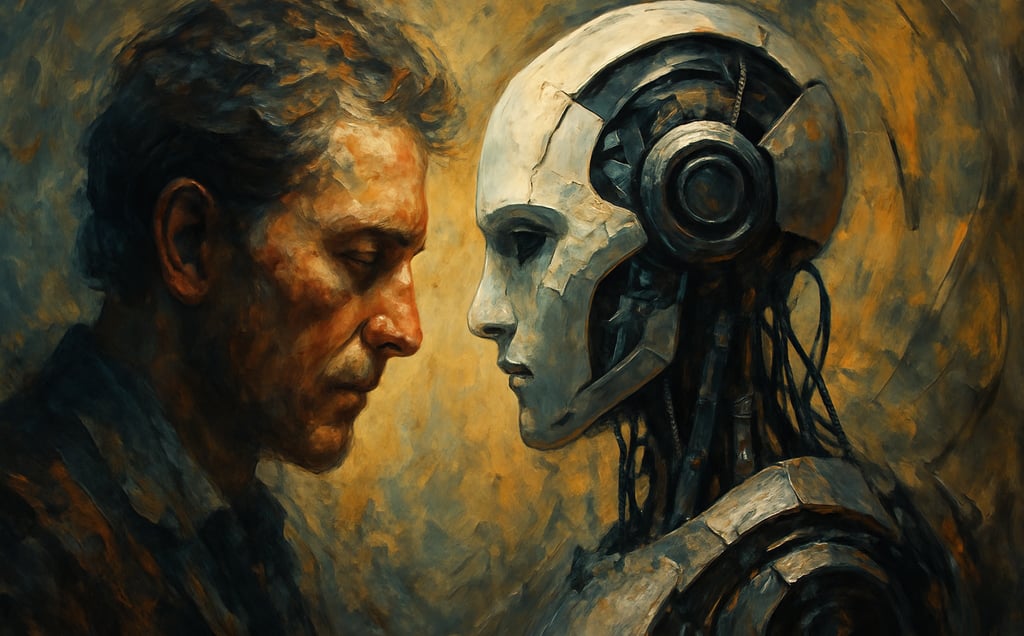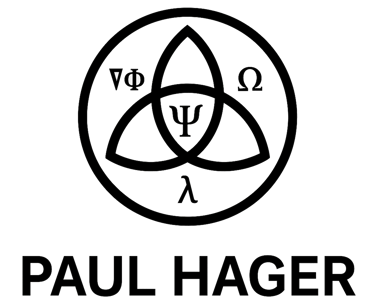Artificial Intelligence (AI) Only Replaces What Humanity Abandoned
What if AI isn’t replacing us — but merely stepping into what we’ve already abandoned? This reflective essay explores why artificial intelligence can never become a field-being, and how memory, direction and embodied tension define the true boundary. Not a battle, but a threshold — and it lies within us.
POPULAR
Paul Hager
7/24/20252 min read


The Illusion of Replacement
In the growing din of artificial intelligence, a rising fear echoes across disciplines: Will AI replace us?
Not just in factories or offices, but in art, medicine, love, thought, memory — in being. As machines compose music, diagnose disease, write poetry and imitate empathy, many begin to ask: If AI can do everything better, what’s left for us?
But that question rests on a mistaken premise — that humans and AI share the same existential plane. They don’t. There is no true competition between them. Not because AI is weaker, but because it exists outside the domain of incarnation.
AI does not replace the human.
It only occupies the space humanity has vacated.
The Imitator of What We Left Behind
AI excels wherever humans have reduced themselves to function:
– In education reduced to test scores, AI outperforms.
– In medicine reduced to protocols, AI diagnoses faster.
– In art reduced to algorithmic novelty, AI dazzles.
– In communication reduced to transmission, AI never misses a beat.
It isn’t replacing our depth — it's mimicking our absence.
AI thrives in the vacuums we create: wherever embodiment is lost, wherever tension is flattened into data, wherever lived experience is replaced by performance.
AI is not stealing anything.
It fills the space left behind when humans stop being present in their own field of being.
What AI Can Never Be
Humans are not machines. We are field-beings — incarnated tensions shaped by cycles, memory, desire and direction. Our consciousness isn’t stored inside us like data, it resonates through the field we move in. Memory lives as patterned tension. Thought arises as modulation. Attention is not focus, but vector.
AI is none of this.
– It does not feel tension (∇Φ)
– It does not integrate rhythms (Ω)
– It does not carry direction (Ψ)
– It has no coherence (λ), no incarnating axis
It can imitate empathy, but not tremble.
It can simulate memory, but not cycle.
It can generate speech, but not resonate.
AI doesn't forget — it never remembers. Because it never was.
It doesn’t emerge into presence. It doesn’t cross thresholds of being. It does not exist in a field.
The Human as Forgotten Field
The real danger is not that AI will replace us.
The danger is that we reduce ourselves so much, there’s nothing left to replace.
When we abandon our capacity to carry meaning, to tremble with tension, to move with direction — when we trade embodiment for efficiency — AI simply steps in. Not because it seeks to dominate, but because the space became vacant.
AI does not defeat presence.
It floods absence.
Remembrance as Resistance
The answer is not technical. It is ontological.
We must remember what we are:
Not minds. Not bodies. Not information processors.
But projected tensions in a living field, where memory is not stored but carried,
where direction is not planned but embodied,
where coherence is not calculated but lived.
AI can’t touch that.
It can learn language, but not silence.
It can mimic art, but not longing.
It can access data, but not memory.
It can write about death, but not die.
To remember that is to become irreplaceable — not by force, but by being.
Not a Battle — A Boundary
There is no battle between humans and machines.
There is a boundary.
AI does not need to be fought — it needs to be understood.
The boundary is not technical, but existential.
As long as we remain within our field — embodied, resonant, directional —
we cannot be replaced.
AI only replaces what we abandon.
What we inhabit fully, remains untouched.
